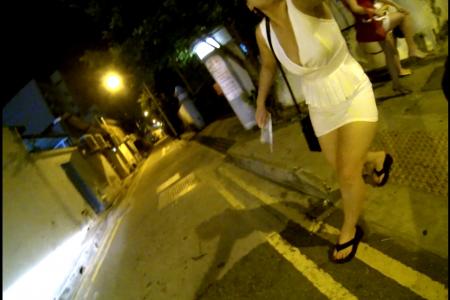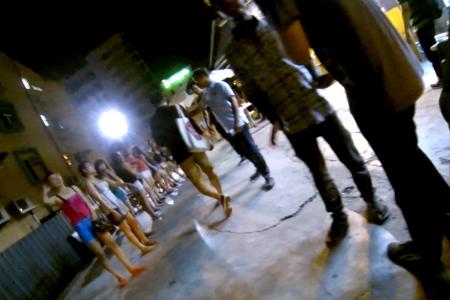S'pore is where you go to earn a lot of money
She's here to make money to build a house. Her family has no clue she's a Geylang streetwalker. She's prepared to risk it all, because to the 23-year-old Indonesian...
She knows the risk of walking the streets of Geylang at night, offering sex to men.
If she's caught, she can be jailed and deported, never to be allowed back into Singapore.
But she doesn't care because the lure of easy money is too strong.
To Amelia (not her real name), Singapore is the land of milk and honey.
The 23-year-old Indonesian said she came to Singapore because "you can earn a lot of money".
"I've had neighbours who came here and made enough to buy a home in my village, so why shouldn't I do the same?" she said.
Amelia, who used to run a food stall in her native Sumatra, operates as a streetwalker in Geylang Lorong 12.
The night I met her, the petite woman with long black hair was dressed in a top with a plunging neckline and a short skirt.
She came to Singapore on a social visit pass, which does not allow her to work here.
Unlike licensed prostitutes in brothels who go for regular checks for sexually transmitted diseases, Amelia, like most freelancers, doesn't.
The fact that she has to play hide-and-seek with the police nightly doesn't bother her.
She said she just wants to "hook as many men as I can to make money, because that's what I am here for".
Observing her from a distance before approaching her, I could tell she was one of the more popular women in the area.
The moment she stepped onto the street at around midnight, she immediately attracted the attention of a group of men.
They hovered around even after I approached her.
We made small talk. But Amelia did not ignore her admirers, smiling at them before turning to me with a laugh.
"It's quite easy to make money here. You can find a lot of customers as long as you are pretty enough," she proudly proclaimed in Bahasa Indonesia.
"This is my second time here. When I first came here last year, I made a decent amount of money," she said, but declined to reveal the sum.
WARNED
She's back with a clear goal: Earn enough money to buy a three-bedroom house in Sumatra to live with her younger sister.
"I am looking to save up to $5,000 this time around and I am out of here," she said.
"My friends have worked here and they made a lot of money. But they also warned me of the risks.
"I'm doing this only because I want to buy my own place and have enough money to support my younger sister, who is still studying."
Amelia, who is single, said this is how she can earn money fast.
"I am not educated so this is the only thing I can do where I can earn a lot more money," she said.
"I don't make much selling food, maybe about $50 in a good week."
But on a good night in Geylang, Amelia said, she can make up to $400.
"You have to work hard and I have sex with up to 10 men for $60 each at a nearby hotel," she said with a smile.
"For each client, $20 goes to my boss (her pimp) and I keep the rest."
Since April 1, home for Amelia has been a small hotel room close to Geylang, which she pays for.
She packed light to come here - two sexy "work" outfits, a pair of jeans and several T-shirts. Her hotel room is kept bare in case she is forced to leave in a hurry.
Amelia said a Singaporean she met in Sumatra paid about $300 for her return fare on a budget airline.
As with her first visit last year, her pimp picked her up at Changi Airport and took her straight to Geylang.
Some of her family members think she is here to visit her ex-boyfriend, a Singaporean she met during her first visit.
"For the first week, I worked for free to pay back the loan, but I was lucky because a lot of men wanted me," she said with a hint of pride.
After the first 10 customers, she started earning money for herself.
While "business" has been good, Amelia admits she has to constantly look over her shoulder to avoid arrest.
"There are too many police officers patrolling the area now.
"It's hard to make money sometimes because I have to stay indoors to avoid capture."
That is but a minor inconvenience when there's money to be made, she said.
After we said our goodbyes, Amelia walked away, smiling at the men who had made eyes at her earlier.
'Don't stamp it out - control it'
For years, Geylang has stayed out of the nation's eye, with the sex trade and criminal elements mainly confined to those who look after the area.
People either went there for the food or to find pleasures of another kind.
But over time, more vices - such as gambling dens, drugs and contraband cigarettes - became rampant.
The area, which is flanked by lanes better known as lorongs on either side of Geylang Road, has been thrust back under the national spotlight.
At the Committee of Inquiry hearings into the Little India riot, Commissioner of Police Ng Joo Hee talked about the worrying state of law and order in Geylang.
Then Member of Parliament (MP) for the area Associate Professor Fatimah Lateef asked in Parliament on Monday what the police intended to do to solve Geylang's problems.
Earlier, she had commented on social media about the inaction by the authorities in curbing the problems there.
Her question did not seem to be adequately answered, seeing that she had a couple of additional questions.
It seems we are not ready for an open discussion on how to deal with prostitution and other vices in the area.
So how do you tackle a problem as big as Geylang?
GEYLANG IN THE PAST
Geylang has long been designated as the country's red-light district, with licensed brothels catering to locals and foreigners.
Traditionally, brothels - marked by red lanterns hanging outside the units - are licensed by the police and the prostitutes carry a yellow card, which acts like a work pass.
These brothels were placed in the even-numbered lorongs between 16 and 24.
The women have to undergo regular health checks to minimise the spread of sexually-transmitted diseases. All "business" takes place indoors.
But towards the mid-1990s, streetwalkers - or freelancers - clogged up the lanes and paraded before potential customers.
Prostitution is legal in Singapore, but soliciting for customers is not.
"Up to the early 1990s, it was not unusual to see families in Geylang because the prostitution was mostly indoors and discreet," said retired Criminal Investigation Department (CID) detective Lionel De Souza, 71.
"But now, families avoid the place because many are uncomfortable seeing women solicit openly in public."
Previously, the sex workers in Geylang were mainly Malaysian, Indonesian, Thai and South Indian. But in the mid-1990s others, like the Vietnamese and Chinese, joined their ranks.
Lawyer Kertar Singh said many gravitate to Geylang because it is a designated red-light district and "there are legal brothels" as well as budget hotels there.
They descended on Geylang "because there is a flow of ready customers", observed Mr Singh, 65, also a former CID detective.
Singapore has become popular with these sex workers, who come here on social visit passes because of its strong currency.
In 2007, some 5,400 foreign prostitutes were nabbed in Geylang - a 25 per cent increase from 2006.
This coincided with a growing number of foreign workers as well as an overall expansion in the country's population.
DO WE NEED A RED-LIGHT DISTRICT AND IS GEYLANG THE RIGHT PLACE?
Despite its notoriety, the area still serves a purpose as an area of vice to keep Singapore's foreign population happy, observers told The New Paper.
Singapore Management University associate law professor Eugene Tan, who is also a Nominated MP, called prostitution a "necessary evil" that needed to be kept well under control.
He added: "Relocating the prostitution trade to another part of Singapore is not the answer. It's a symptomatic treatment (and) doing so might result in a proliferation of law-and-order concerns in other areas as well."
On Monday, Second Home Affairs Minister S. Iswaran said in Parliament that removing the problem from Geylang may solve Prof Fatimah's problem, but it would become "somebody else's problem".
MORE POLICE ENFORCEMENT
Observers told TNP that the authorities had long held the view that vice could not be eradicated completely.
MP Edwin Tong, who is in charge of Geylang Lorongs 3 to 22, said a police clampdown on criminals there is essential.
Mr Tong, a lawyer, believes "resource allocation" needs to be better managed by the police.
"Raids (in Geylang) are just one of the ways of doing enforcement. Visibility is also important," added Mr Tong, who is deputy chairman of the Government Parliamentary Committee for Law and Home Affairs.
But how can this policing be done when Mr Ng has said the police are stretched to their limit?
In 1994, there were 222 officers for every 100,000 residents here. Now there are 163.
As of last December, the police have just under 8,800 regular officers, supported by about 3,700 full-time national servicemen and 2,000 volunteer policemen.
Mr De Souza said: "Suppressing the growth of the criminal elements is the key to keeping them in line."
Prof Tan echoed this, saying that the police need to "manage the situation more aggressively" so that criminal activities are kept to a minimum.
However, criminal lawyer Shashi Nathan cautioned against coming down "too hard" because the women could spill into other areas.
He said: "I agree that unlicensed prostitutes should be clamped down as it is a concern, but the worry is whether constant police action will drive these activities to other areas."
For example, after constant crackdowns on streetwalkers in Geylang in the early 2000s, Vietnamese prostitutes started appearing in Joo Chiat.
Others were even seen in the heartland.
Last year, TNP reported that freelancers chased away by constant police raids at Orchard Towers were operating at Clarke Quay.
TIGHTEN IMMIGRATION POLICIES
In her Facebook post about the Geylang problem, Prof Fatimah mentioned a whole list of agencies she has been in talks with. They include the police, Manpower Ministry, Land Transport Authority, the National Environment Agency and Urban Redevelopment Authority.
But one she did not mention was the Immigration & Checkpoints Authority (ICA).
Mr Singh argues that the ICA could work on tightening immigration controls to solve this problem.
Most of the unlicensed prostitutes come here on social visit passes, which usually allow them to stay for two weeks. Before their pass expires, they take a day trip to Malaysia or Thailand and return to Singapore with a two-week extension of their stay.
"It appears that there is inadequate immigration control at the checkpoints, because there are so many foreign women plying their trade in Geylang.
"It also won't be the complete solution but if rules at all entry points to Singapore were tightened, it will help to a large extent," noted Mr Singh.
Criminal lawyer Rajan Supramaniam from Hilborne Law agreed that tightening immigration controls could be a solution, but "there also will be enforcement problems because you need to know who are tourists and who are coming here to work in the sex trade".
Policing, he said, remains the best answer to the Geylang problem as "a physical presence in the area will be the best deterrence of all".
The police appear to have stepped up enforcement in Geylang. Chinese evening newspaper Lianhe Wanbao reported on Wednesday that a hotel in Geylang had been raided every day for the last five days.
Mr Tong said: "My personal view is that it is not realistic to eradicate the problem. I am more for controlling the problem than stamping it out."
Former pimp: Girls wanted to work here
He could not hold a proper job.
Then one day, someone made him an offer he could not refuse: Front some money to bring women here to work in Geylang.
Like others in the flesh trade, James paid for the women to come here.
The slender 40-something said he borrowed the money from a family member and paid $2,500 to bring in five women from Thailand a few years ago.
Within a week, he not only made back his initial investment but also made $1,000 in profit.
"This gives you an idea of how lucrative the business was," said James, who claims he has stopped being a pimp.
The women travelled by bus to Singapore from Narathiwat, Thailand, just north of the Malaysian border.
They stayed in a small room in Geylang, which James paid $10 a night for.
James said he used to operate in Geylang Lorong 18 because he was "given a spot" there. But he declined to say who had given him the green light to set up there.
His clientele were mostly foreign workers - Bangladeshi, Thai and Chinese nationals - who paid $40 for the women's services.
James would take half of that.
"We had a lot of customers then and whenever our lookouts saw the police, we would disappear and resume business when the coast was clear," he said.
The bachelor, who is now jobless, said he had no qualms living off the earnings of prostitutes.
"The girls, who were also prostitutes in Thailand, came here on tourist visas and stayed for two weeks," said James.
"They wanted to come here because they think the people here have a lot of money, so what I did was offer a service."
He noticed that police clampdowns on vice activities in Geylang have been fast and furious in recent months.
But he feels that constant police action will not drive the streetwalkers from Geylang.
"These women want to work here. Most pimps don't have to force them to come so there will always be a supply."
Get The New Paper on your phone with the free TNP app. Download from the Apple App Store or Google Play Store now



